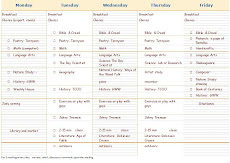Heritage History
I have been wondering:
Does my Ambleside plan for this year fit in with Non Multa Sed Multum? Talking about the History program in the Latin Centered homeschool, Drew Campbell says:
Still other programs divide history into two streams, studying world history and national history simultaneously. This is the method of the acclaimed Core Knowledge Sequence, championed by E. D. Hirsch, Jr., and of some Charlotte Mason-influenced home school programs, such as Ambleside Online. This dual approach is also common in traditionminded European schools.He goes on to say:
In the previous edition of this book, I recommended a multi-stream approach encompassing classical (ancient), Christian (medieval), and modern historical studies. While I still believe that such an approach can work well and commend it to those who have found it useful, it proved too complicated for most readers, particularly those with larger families.When I first started homeschooling 14 years ago, I had no theories about how to approach history. I used a conventional Catholic correspondence program and soon knew what I DIDN'T want to do -- repeat American history through boring facts and short, dry sentences and a few pious sentiments.
That was one of the things that attracted me to Kolbe Academy. Kolbe used Greenleaf's Famous Men program and my children and I loved the chronological cycle approach to history and used it for several years.
One of the drawbacks, however, was that we never seemed to get around to very much American history. Thus, the Core Knowledge approach appealed to me. But raising six children, one of them medically fragile, I had enough to do covering the basics without planning and implementing two or more separate history programs. Often, we ended up progressing through World History for seven months of the year and then doing an extended unit on American History in the spring and summer.
Ambleside and later, Mater Amabilis, was a help for me here. These combined the Core Knowledge type sequence with books of literary value. I have been doing it this way for the last couple of years but it has taken time and effort to feel comfortable with the "scattered" effect of so many different courses.
I still am not sure. I get a bit claustrophobic with the "straight chronological cycle" too. And I found that my family would get so wrapped up in the cool ancient/medieval European history (which we loved, and so much good fiction for the middle ages particularly!) that we would tend to skimp on US History.
This wasn't so much so with my second son. He devoured history books during the summer and in his spare time. But my most recent set of kids -- hmm, sometimes I wonder if they could tell me who Abraham Lincoln was. I'm a bit scared to ask.
So I am making sure we focus on US History next year and still have some room to spare for our Plutarch and our Renaissance Europe.
I think it will still fit in with Multum non Multa because I keep an eye on the main thing -- a few books read carefully, the rest there for entertainment and extra context.



Interesting link Willa- looks like it has a lot of the same books as Baldwin.
ReplyDeleteKristie
Yes, it does -- it actually mentioned that some of the books in the repository are used by permission of Baldwin.
ReplyDeleteBut it also has some I haven't seen before.